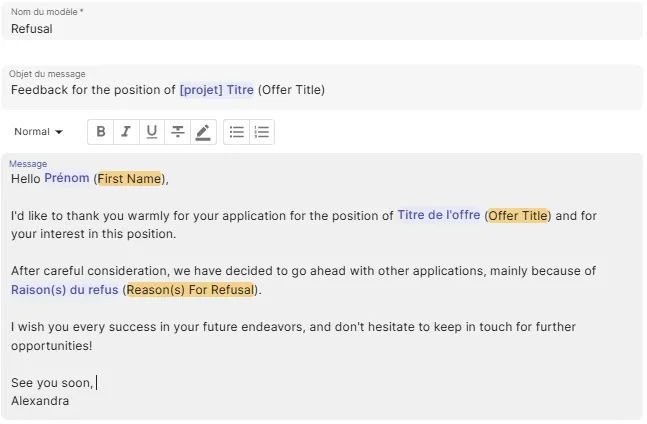In a world where talent is increasingly in demand, providing feedback to candidates has become essential for standing out as an employer.
The numbers speak for themselves: up to 62% of candidates say they never receive feedback after an interview (Parlons RH and Jobijoba 2020). I’m not sure if this has changed much, despite the number of tools available and the importance of employer branding.
And according to a study by APEC (Association for Executive Employment) published in May 2024, more than half of executives expect a response to their application within three weeks and hope for feedback, even brief, from the recruiter fifteen days after a job interview.
As you can understand, the lack of feedback not only leaves a negative impression on the candidate experience but also affects the company’s image. Today, tools like Jarvi simplify this process by making feedback accessible, personalized, and automated, allowing recruiters to provide quality follow-up without spending hours on it. We’ll discuss this right here.
1. What is feedback and why is it essential?
In the context of a recruitment process, feedback is the response that the recruiter gives to the candidate after each selection stage, whether to inform them of progress or to notify them of a rejection.
Providing feedback allows the candidate to understand where they stand in the process, but also what influenced the recruiter’s decision. In short, feedback shows the candidate that their time and interest in the company are valued and recognized.
Moreover, a Glassdoor study reveals that 82% of candidates consider constructive feedback as a determining factor in the candidate experience. Good feedback also improves the employer’s image: it proves that the company cares about its potential employees and highlights its professionalism.
2. What makes good feedback?
Good feedback is first and foremost personalized. It allows the candidate to feel that they are being considered as an individual, not just another number (which is a common criticism of certain types of companies). However, personalizing each message can become particularly time-consuming for recruiters, especially when they are managing dozens of applications for each position.
This is where solutions like Jarvi come into play. By enabling simple and quick personalization, even automated messages can be tailored to candidates.
It’s important to note that automation doesn’t mean a loss of attention. With customizable input fields and flexible templates, it’s possible to create enriched feedback that maintains a human touch, keeping only essential keywords to be adapted. This reinforces the perception of the company’s professionalism and optimizes the candidate experience, even when they are not selected.
Note: despite everything, a generic message is better than nothing: it indicates to the candidate that the company respects their commitment and application, and shows them that they are entitled to an explanation, even if brief. Obviously, generic messages without substance should be avoided, but it is still possible to have different generic templates depending on the case: lack of relevant experience, more experienced candidate selected, etc.
3. Key moments for providing feedback: where and when to communicate
Beyond the quality of feedback, its timing plays a crucial role in the candidate experience. Every touchpoint with the candidate in the recruitment process is an opportunity to provide feedback. Here are the stages where it’s particularly crucial to give feedback:
- After each interview: whether the candidate has had an initial phone screening or an in-depth interview, feedback allows them to stay informed about the process. This can be a brief response confirming they’ve moved to the next stage or a message explaining why they won’t be moving forward.
- At the end of the process: for candidates who are not selected at the end of the recruitment process, closing feedback is essential (even though it pains me to have to remind this). It’s often the last interaction between the candidate and the company, and an honest, respectful, and constructive feedback is necessary to end this moment on a positive note.
- When an application is put on hold: sometimes, potential candidates are put on hold, especially in just-in-time recruitment or when decisions are delayed. It’s important to keep the candidate informed and not leave them in uncertainty, which improves the perception of the company.
4. What should good feedback include?
Providing effective feedback isn’t always easy. Here are some elements that help give comprehensive and appreciated feedback:
- Appreciation: A thank you for the time spent and energy invested in the application is essential. It shows the candidate that the company recognizes their commitment.
- Feedback on the interaction: This feedback should include specific elements about the exchange. If possible, mention skills that were appreciated or, conversely, areas for improvement to help the candidate progress. This type of feedback is often perceived as a sign of respect and goodwill.
- Constructive advice: When relevant, advice for future applications or suggestions for improvements can help the candidate progress. This can be seen as a sign of empathy and attention from the recruiter, thus strengthening the employer brand.
5. Automating feedback with Jarvi: simplicity and personalization at every step
Using an ATS (applicant tracking system) to track applications is already the minimum. But with tools like Jarvi, it’s possible to give quality feedback while optimizing the recruiter’s time. Here’s how to use it to build a smooth process that respects candidates’ time:
- Create an input field for the reason for rejection: instead of writing a message from scratch for each feedback, identify the main reasons why a candidate is rejected (skills, company culture, etc.). This field, integrated into Jarvi, allows you to enrich each feedback without making the process cumbersome.
- Develop a feedback template: create a feedback model with a main text and placeholders for personalized information. For example, “Thank you for your time and for the discussion about your skills in [main skill].”
- Define a sending rule: choose the optimal time to send feedback, such as within 24 hours after an interview, which demonstrates the company’s professionalism.
- Automate sending: once the template and custom fields are in place, you can schedule the sending of these messages.

6. Application examples
Feedback after a positive interview (candidate moves to the next stage)
Hello [First Name],
Thank you for your time and for this constructive discussion about your experience and skills in [Main skill discussed]. We are pleased to inform you that you have been selected for the next stage of the recruitment process for the position of [Job title].
During this interview, we particularly appreciated your approach to [Specific approach or observed quality] and your knowledge of [Complementary technical skill or soft skill].
You will be contacted soon to arrange this appointment with [Name or title of the next interviewer]. Thank you again for your commitment to [Company name] and we look forward to continuing our collaboration!
Best regards,
Customizable fields: first name, main skill discussed, job title, specific approach or observed quality, complementary technical skill or soft skill, name of the next interviewer, company name.
Feedback for a rejection after interview
Hello [First Name],
Thank you for taking the time to meet with us and share your ideas for the position of [Job title]. We particularly appreciated your [Complementary technical skill or soft skill], but after careful consideration, we have chosen to proceed with another candidate.
To enhance your chances for similar positions in the future, we recommend deepening your knowledge in [Skill or area to work on].
Thank you again for your interest in [Company name]. We wish you all the best in your professional endeavors and remain open to the possibility of collaborating with you in the future.
Best regards,
Customizable fields: first name, job title, complementary technical skill or soft skill, skill or area to work on, company name.
Pending feedback (when decision is postponed)
Hello [First Name],
Thank you again for our recent conversation regarding your application for the [Job Title] position at [Company Name]. We were impressed by your skills in [observed skill].
However, due to a slight delay in our recruitment process, the final decision will be made by [Expected period or date]. We will keep you informed as soon as a decision is made.
We appreciate your patience and remain available if you have any questions in the meantime.
Best regards,
Customizable fields: first name, job title, company name, observed skill, expected period or date.
Constructive feedback with advice
Hello [First Name],
Thank you for the interview and for taking the time to present your background for the [Job Title] position. We appreciated your expertise in [Observed technical or soft skill] and your approach to [Specific approach or quality].
Although we have decided to move forward with another candidate, we would like to share some advice for future opportunities in this field. We recommend that you [Specific advice].
We thank you for your interest in [Company Name] and hope that this advice will be useful for your future applications.
Best regards,
Customizable fields: first name, job title, company name, observed technical or soft skill, specific approach or quality, specific advice, company name.
In conclusion: redefining feedback to enhance the candidate experience
Feedback is much more than just a message: it’s one of the keys to a successful candidate experience. By optimizing the feedback process with tools like Jarvi, recruiters can offer quick, structured, and personalized feedback to each candidate. This follow-up helps to showcase the company, retain talent, and strengthen the employer brand.
By focusing on a feedback culture, every interaction becomes an opportunity to build loyalty with talent and reinforce your company’s brand image.
So, are you ready to transform your feedback practices and offer a quality candidate experience?

